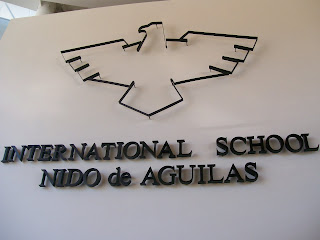Nido de Aguilas

"Eagle's Nest"
Wednesday I went to visit a private international school for students from all over the world. It's located on the outskirts of Santiago and has approximately 1400 students. All of the classes (except for Spanish and Chilean history) are taught in English. A good number of their teachers are American. I scheduled an interview with the headmaster in an attempt to learn a thing or two about international education. Below I've listed the questions I remember asking and his responses (as well as I can remember). Obviously the interview below is not word-for-word accurate, but I think I'm pretty close in getting the general ideas across.
Me: Hi.
Him: Hi
Me: How are you?
Him: I'm fine. (Okay, just kidding)
Me: Where are most of your students from?
Him: About fifty percent are Chilean and the rest come from 40 different countries, primarily the US.
Me: What's your background in education?
Him: I used to work in public schools in the US, mostly in Arizona. I was the principal of a fairly large-sized high school there. Since then I've worked internationally. I've been all over the world (I think he mentioned Manilla and Cairo). I'm a career "international." I won't be here for too much longer. That's the way most of our teachers are as well. They come for the challenge, stay four or five years, and then move on.
Me: What mechanisms do you have to hold your school accountable?
Him: The number one mechinism is our students' parents. Aside from that we monitor our progress with IB test scores, grade-level assessment, and state tests used in the States.
Me: Is your cirriculum developed internally?
Him: Yes. We look at state standards from states we feel are leaders in cirriculum development and then tailor them to meet our students' unique backgrounds and needs.
Me: Where does your funding come from? How much do you spend?
Him: Almost all of our funding comes from tuition. Our opperating budget is about 16 million dollars per year and we have 1400 students to spend it on.
Me: How much do your teachers get paid? Do you use a typical salary scale like you might find in the States?
Him: Exactly. If you have no years of experience and a bachelor's, then you're looking at about 36k. If you have a master's with 10 years of experience, then your looking at about 46k. We don't like to hire people with less than two or three years of experience though, and we really look for folks who have proven they can live internationally. Living internationally is different from wanting to live internationally. Your first month or so is like being at Disney Land. Everything is new and exciting, but after a while it's just like any other job. The language seems a challenge at first, but if you don't speak it, it just becomes annoying. Many people living internationally for the first time begin to get homesick fast, especially after the first few months. They start to mark the date to go home on their calendar and then that's all they can think about. Life is no fun at that point. Not everyone can make it internationally.
Me: What do you think the biggest challenge for a teacher is at this school?
Him: Well the kids are all great and polite. Discipline is not a problem here. I guess the greatest challenge is the expectations put on you by the parents and your co-workers. This is not a place to get your feet wet. If people realize that you're brand new and flying by the seat of your pants, they're going to have some problems. A lack of truly in-depth content knowledge is going to do you a disservice here. The kids will pick up on it and the parents will too. You'll be doing a disservice to them because they'll expect more out of you. That's why we don't like to hire brand new teachers.
Me: What are your impressions of the IB program? How do you get teachers trained in IB?
Him: It's a good enough program. It's just like AP, only a little more rigorous. IB does training in Chile, but it's almost always in Spanish. So our English speaking teachers are sent to the US to get their training.
That's all of the interview. Pictures of the school are on the next post.
Thanks so much for this post! I´m in Stgo shopping around for better jobs (better than the current one), and this was exactly the info I was looking for!
ReplyDeleteThank you for the interview info. It was very interesting as I'm a public school teacher in the USA.
ReplyDeleteI teach in an intl. school in Latin America and Nido de Aguilas is considered one of the best reputation-wise. I would imagine that there is quite a great deal of selectivity that they enjoy when it comes to hiring teachers. Everyone in Latin America wants to go to Chile! :-)
ReplyDelete